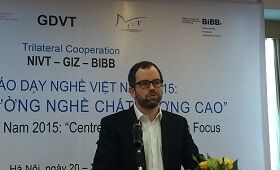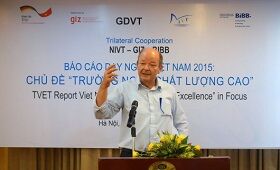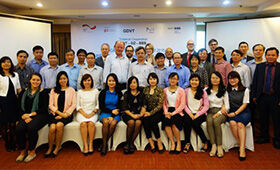The new TVET Report Viet Nam 2015 - developed within the scope of Vietnamese-German cooperation
The annual TVET Report Viet Nam is the result of a successful trilateral cooperation between NIVT, GIZ and BIBB. Key topic of the 2015 Report are Centres of Excellence. At a workshop in Hanoi, representatives of the BIBB shared expertise on inter-company vocational Training centres in Germany.

“The annual TVET Report for Viet Nam, produced by NIVT/GDVT in close cooperation with GIZ and BIBB since 2011, is a very important tool for data-based policy and political decision making. Focusing on CoEs means focusing on a very important system component that serves to enhance the quality of a skilled workforce”, stated Dr Nguyen Hong Minh, newly appointed General Director of GDVT in his opening speech at the workshop “TVET Report Viet Nam 2015: Centres of Excellence in Focus”.
"Focusing on CoEs means focusing on a very important system component that serves to enhance the quality of a skilled workforce” (Dr Nguyen Hong Minh)

The workshop took place in Hanoi from 20 to 21 April 2016 and was co-organized by the National Institute for Vocational Training (NIVT)/General Directorate for Vocational Training (GDVT), the Gesellschaft für internationale Zusammenarbeit (GIZ) GmbH and the Federal Institute for Vocational Education and Training (BIBB). The main objective of the workshop was to reach an agreement on indicators for the next TVET report relevant for monitoring the implementation of the TVET strategy 2020 concerning the development of Centres of Excellence (CoE).
Since 2010, GIZ and BIBB have been providing technical advice to NIVT by means of workshops, study visits and integrated experts to support the establishment of a sustainable TVET monitoring and reporting system. Research capacities within NIVT have been strengthened to develop national TVET reports, the first of its kind in the ASEAN region. CoE in Vietnam are to some extent comparable to the Inter-Company Training Centres (ÜBS) in Germany with the major difference, that CoE unite vocational school and practical training institution under one roof. The core function of CoE is the provision of high-quality and employment-relevant initial and further training following international standards. The TVET Report for Viet Nam 2015 will have a special focus on monitoring the development of 45 CoE for Vocational Training which are supposed to provide high quality initial and further vocational training on a comparable level with international standards, as stated in the Prime Minister’s Decision No. 761. The data analysed in the TVET report will allow evidence-based policy decision-making for the TVET sector in general and specifically for the development process of the 45 CoE.

During the workshop both international and national experiences were shared. Elements of the German dual vocational education and training system were presented by Michael Schwarz from BIBB and Peter Rechmann from GOVET. They illustrated the structure and operation of inter-company vocational training centres in Germany with a particular focus on the joint financing by the Federal Government, the States and the business sector as well as the flexible approach of the training programmes depending on regional or sectoral specifics. Dr Horst Sommer, Programme Director of the Programme Reform of TVET in Vietnam at GIZ, tied on to this in his speech, outlining the history of the development of the CoE approach. He critically illuminated the different criteria for CoE in Vietnam underlining: “The Prime Minister’s Decision No. 761 is formulated as an open programme. Certain elements of the German TVET system can be adapted to the specific needs and the current situation regarding CoE in Vietnam.”
Pham Xuan Thu, Deputy Director of NIVT, gave an overview of the strategy of the Vietnamese government to establish 45 CoE and underlined the importance of the different criteria for CoE. The criteria were also reflected in the results of the survey on the status of the 45 CoE carried out in 2015 which was presented by Dr Pham Vu Quoc Binh, Director of VVTA. Representing one of the 45 CoE, Nguyen Khanh Cuong, Vice Rector of the LILAMA2 training centre, gave an interesting example of how the CoE criteria formed the basis of the development plan of LILAMA2 which was developed by the management and teachers of LILAMA2 with the support of a German expert.

The following group work showed the great demand for exchange between the participants. In fruitful discussions sub-criteria for the categories of CoE criteria as well as related guiding question relevant for reporting were elaborated. The guiding questions served as a basis for the development of indicators for the TVET Report Viet Nam 2015. One possible indicator developed in the workshop aims at measuring the quality and extent in which a potential CoE publishes their business figures and financial reports. Another indicator defines the share of enterprises and associations participating in the development of the TVET institutes’ curricula to measure the demand and practice orientation of the training programmes.
In the final session the director of NIVT presented the lessons learnt from the previous TVET reports and introduced the newly established digital feedback system to the report, which is accessible via the NIVT website (see "Further information" column).
After two days of intensive work the participants agreed on a timeline to develop the different chapters of the upcoming TVET Report Viet Nam 2015. Co-organizer Dr Vu Xuan Hung, Director of NIVT, concluded in his closing speech: “This was one of the most successful workshops I participated in. I am happy to agree on the working plan for the next TVET Report and I am looking forward to the upcoming challenges.”
Background
According to assessment of the World Bank (WB), Vietnam is very short of highly skilled and technical workforce. Most of employers said that recruitment was difficult because candidates had no appropriate skills. Regarding quality of workforce, if using a scale of 10, Vietnam only obtains 3.79 points; is ranked at 11 among 12 Asian countries involving in the ranking of the WB.
The TVET Report Viet Nam 2015 will be the fourth report following the previous issues in 2011, 2012 and 2013/2014. With the aim to provide information for policy makers, managers, researchers, vocational training institutions, enterprises, international organizations and foreign investors with regards to vocational training activities and vocational training development in Vietnam, from 2011 up to now, national reports on vocational training are regularly developed and published in Vietnamese and English.